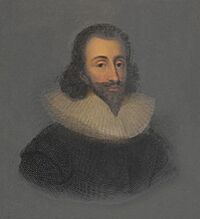John Eliot (statesman) facts for kids
Quick facts for kids
Sir John Eliot
|
|
|---|---|
 |
|
| Born | 11 April 1592 Cuddenbeak, Port Eliot, Cornwall, England
|
| Died | 27 November 1632 (aged 40) Tower of London, England
|
| Cause of death | tuberculosis |
| Spouse(s) |
Radigund Gedie (or Gedy)
(m. 1611–1628) |
| Children |
|
| Parent(s) |
|
Sir John Eliot (born 11 April 1592 – died 27 November 1632) was an important English politician. He was put in the Tower of London many times by King Charles I. He died there because he strongly believed in and fought for the rights of Parliament.
Contents
Early Life and Education
John Eliot was born at Cuddenbeak, a farm on his family's Port Eliot estate in St Germans, Cornwall. His father was Richard Eliot and his mother was Bridget Carswell. The Eliot family was an old family from Devon who had moved to Cornwall.
John went to Blundell's School in Tiverton. Later, he studied at Exeter College, Oxford. After three years, he left the university to study law. He also traveled for several months in France, Spain, and Italy. For some of this time, he traveled with a young man named George Villiers, who later became the 1st Duke of Buckingham.
Starting a Political Career
Eliot was only 22 years old when he became a Member of Parliament (MP) for St Germans in 1614. In 1618, he was made a knight. The next year, with help from Buckingham, he became the Vice-Admiral of Devon. This job gave him a lot of power to protect the coast and control trade in the area.
He was very energetic in his new role, which soon led to problems. In 1623, he managed to capture a famous pirate named John Nutt. This pirate had caused a lot of damage to English trade for years. However, the pirate had a powerful friend in the government, Sir George Calvert, who helped him get pardoned. Sir John Eliot, on the other hand, was put in Marshalsea prison for almost four months based on charges that couldn't be proven.
Fighting for Parliament's Rights
A few weeks after he was released, Eliot was elected as an MP for Newport in 1624. In his first speech, he showed he was a powerful speaker. He bravely demanded that Parliament's freedoms and rights, which King James I had ignored, should be protected.
When Charles I became King in 1625, Eliot pushed for laws against Roman Catholics. At first, he was a friend and supporter of Buckingham and approved of the war with Spain.
However, Buckingham's poor leadership and the King's dishonest actions towards Parliament made Eliot lose trust. Eliot became sure that Buckingham was too ambitious and dangerous. In 1626, Eliot became a leader in Parliament. He immediately asked for an investigation into a recent military failure. On 27 March, he openly criticized Buckingham and his government.
The King tried to stop him, but Eliot was not scared. He convinced Parliament to delay giving money to the King and to send a message saying they had the right to check what ministers were doing. On 8 May, he was one of the people who presented the charges against Buckingham to the House of Lords. He compared Buckingham to Sejanus, a powerful but dangerous figure from Roman history.
The next day, Eliot was sent to the Tower. Parliament refused to do any work until Eliot and another MP, Sir Dudley Digges, were freed. They were released, and Parliament was closed down on 15 June. Eliot was immediately fired from his job as Vice-Admiral of Devon.
In 1627, he was put in prison again because he refused to pay a "forced loan," which was a tax the King demanded without Parliament's approval. He was freed just before Parliament met in 1628. He was elected as an MP for Cornwall. He helped lead the fight against unfair taxes and was a key person in creating the Petition of Right. This document limited the King's power.
After Buckingham was killed in August, Eliot led the attack in 1629 against certain religious groups that he felt were too close to the King's views.
In February, Parliament debated whether the King had the right to collect certain taxes called tonnage and poundage. When the King ordered Parliament to stop meeting, two MPs, Denzil Holles and Benjamin Valentine, held the Speaker, Sir John Finch, in his chair. This allowed Eliot's statements against illegal taxes and religious changes to be read to Parliament.
Because of this, Eliot and eight other MPs were put in the Tower on 4 March. Eliot refused to answer questions during his questioning, saying he had parliamentary privilege (meaning he couldn't be punished for things said in Parliament). On 29 October, he was sent back to Marshalsea prison. On 26 January, he appeared in court with Holles and Valentine. He was charged with trying to resist the King's order and refused to accept the court's power over him. He was fined £2000 and ordered to stay in prison until the King was happy and he had apologized. Eliot bravely refused to apologize.
While some of the other prisoners had some freedom, Eliot's time in the Tower was very harsh. King Charles was especially angry with him because Eliot was his main political opponent and had strongly opposed Buckingham. The King called him "an outlawed man, desperate in mind and fortune."
Writings in Prison
While in prison, Sir John Eliot wrote several books:
- Negotium posterorum: This was an account of the Parliament in 1625.
- The Monarchie of Man: This was a book about how governments should work.
- De jure majestatis, a Political Treatise of Government: This was also about government, based on another writer's work.
- An Apology for Socrates: This was his own defense, like a speech explaining his actions.
Death and Legacy
In the spring of 1632, Eliot became very ill. In October, he asked King Charles for permission to go home to the countryside, but the King refused unless Eliot apologized. Eliot would not apologize, so he stayed in prison.
He died of a lung illness called consumption (now known as tuberculosis) on 27 November 1632. He was buried at St Peter's Ad Vincula Church, which is inside the Tower of London.
When his son asked the King if he could move his father's body to St Germans, Charles refused. He said, "Let Sir John Eliot be buried in the church of that parish where he died." Many people felt that Eliot's death, caused by the King's harshness, made the conflict between the King and Parliament much worse.
Eliot was known as a great speaker. He was full of passion and strong beliefs, and he could inspire others with his words.
In 1668, many years after his death, the House of Lords officially overturned his conviction. They stated that his punishment was illegal and went against the freedom and rights of Parliament.
Family Life
In June 1609, Sir John Eliot married Radigund (or Rhadagund) Gedie. They had five sons and four daughters:
- John Eliot
- Richard Eliot
- Elizabeth Eliot
- Edward Eliot
- Bridget Eliot
- Radigunda Eliot
- Susanna Eliot
- Thomas Eliot
- Nicholas Eliot
The current Earls of St Germans are descendants of his youngest son, Nicholas.
Images for kids
 | Ernest Everett Just |
 | Mary Jackson |
 | Emmett Chappelle |
 | Marie Maynard Daly |


